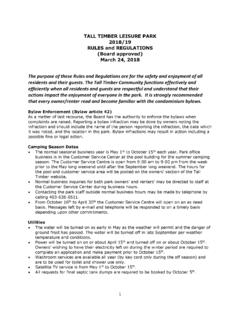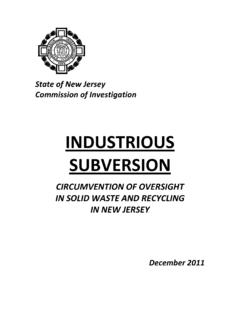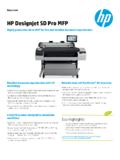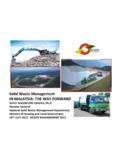Transcription of Gross Receipts Tax FAQs for Contractors
1 Page 1 of 4 January 1, 2013 The 30-day Legislative Session in 2012 saw the construction industry helping Governor Martinez pass HB 184 which sought to curtail Tax Pyramiding for the construction industry. The bill passed, was signed into law, and became effective on January 1, 2013. During discussions with various members as the NMHBA Senior Officers have traveled around the state to update local HBAs over the past year, it has become apparent that our industry members have many questions about the process of compliance with the Gross Receipts and Compensating Tax Act. These faqs have been prepared by NMHBA staff to help clear up a few points: Q.: I construct buildings, and I believe I manufacture real property, so is my construction business considered a manufacturing business for GRT purposes?
2 A.: No. While it may be a shock to most in the construction industry, for GRT tax purposes the building of improvements upon land to create real property is considered a service, and not a manufacturing process. That means you must comply with TRD s regulations for service companies. Q.: I paid sales tax when I purchased the construction materials from the lumber yard, and I paid taxes on each of the bills from my subcontractors; I ve paid all I need to, right? A.: WRONG. New Mexico does not have a sales tax like other states we have a Gross Receipts Tax which means businesses pay a tax on their total Receipts minus any non-taxable deductions. In New Mexico it is the seller of the goods or services who is responsible for paying the tax due on the transaction. It is customary for the seller to ask the buyer to pay the seller s GRT and add it into the total purchase price.
3 If you missed the explanation in Jack s April 2012 Housing Journal article, it is attached to the end of these faqs . Q.: How does the NTTC process work? A.: Put simply, a buyer (construction business or construction-related business) of goods or services issues a Non-Taxable Transaction Certificate (NTTC) to the seller of the goods or services, certifying why the entire (or portion of a) transaction is deductible from the Gross Receipts of the seller s business. The seller keeps these on file and reports their Gross Receipts (minus the deductions) to TRD. The seller keeps the actual NTTCs and must present them to TRD when requested (usually during an audit). If the audit reveals some transactions for which NTTCs were issued were not appropriate, it is the seller who is responsible to pay the GRT (plus any interest or fines).
4 Sometimes the seller will ask the purchaser who provided the inappropriate NTTC to pay the GRT retroactively. Q.: Do I need to be a state-licensed contractor to be a construction business ? A.: TRD rules define a construction business as someone who holds a contractor s license issued by the state or who performs construction activities for which the Construction Industries Division (CID) does not require a contractor s license. Listing a license number when it is not attached to the company involved in the transaction is fraudulent activity punishable by TRD. If you are not required by CID to hold a contractor s license but are performing a construction activity listed in NMSA, you may ask CID for a letter stating that fact. TRD wants you to keep in your file documentation stating that at as of the date you were performing the construction service you were not required to be licensed.
5 Q.: Does my construction activity have to be my primary business, or can I issue NTTCs for my construction business activities when my primary business is something else? A.: In the current economic climate there is sometimes not enough work to allow a business to perform only construction activities, and many companies have had to diversify to keep the doors open. Your company may issue NTTCs when you are performing construction activities. Gross Receipts Tax faqs for Contractors Page 2 of 4 5931 Office Blvd., NE Suite #1 Albuquerque, NM 87109 Phone: (505) 344-7072 1-800-523-8421 FAX: (505) 344-3103 New Mexico Home Builders Association Q.: I am a mechanical contractor whose company also manufactures mechanical components that are sold to other mechanical Contractors .
6 Am I a service or a manufacturing company for GRT purposes? A.: Both. When performing mechanical contracting services for a general contractor or homeowner you are subject to the sections of the NM Gross Receipts and Compensating Tax Act that apply to construction businesses. All activities related to purchasing materials, manufacturing mechanical components and selling them wholesale to other mechanical construction businesses are subject to the sections concerning manufacturers. Q.: I am a Design-Build construction business with a state-issued contractor s license who includes design services. I pay another company to print the drawings that I include in the sale of my services. Can I provide an NTTC to the supplier of my drawings? A. If you include the design services as part of the construction services you provide for the construction project for which you collect GRT, then your supplier may accept an NTTC from you for the drawings.
7 Keep in mind, the person responsible for paying GRT to the state is the supplier of the drawings, and if either of you get audited by TRD, then the supplier is the one who will have to pay if you can t prove you were a construction business at the time of the transaction. Q.: I am a construction business. I buy saw blades and abrasives in bulk using NTTCs, and store them until needed. Then I pull what I need out of inventory and charge the exact amount used to the specific project. Is there a problem with this? A.: Not for you, but it might end up costing Lowe s or Home Depot if they are ever audited by TRD. Consumables like these are tangible personal property that, under current TRD interpretation, does not become a permanent part of the project because they can t be seen or touched to become an ingredient.
8 (Pitching the used saw blades into the concrete footing doesn t count, although maybe recycling them as an architectural detail would qualify for the deduction if the saw blades became an ingredient in something like the address numbers or a light fixture!) The problem is for the supplier selling you the supplies they keep your CRS number on file, and then keep a perpetual NTTC going for everything you purchase from them in the future. It is the supplier who may have to pay GRT for these items, and if they did not collect the tax from you at the time of sale, they will either have to pay it themselves or come asking you to reimburse them. If you are purchasing from a supply house whose relationship you value, you might be doing them a favor to separate your consumables from your construction materials and pay the GRT for the consumables as you go along.
9 Q.: Is there a benefit to identifying some of my activities as manufacturing instead of construction service? A.: Not under today s regulations. However, sometime in late 2013 it is hoped that TRD will complete the new regulations for the manufacturing industry to implement their much broader deductions from GRT that allow deductions for utilities and materials consumed in the manufacturing process. In 2013, if you are manufacturing construction materials such as ducting for mechanical systems, there may be quite a benefit to identifying that portion of your business as manufacturing, even though you are required by the Construction Industries Division (CID) to hold an MM-3 or MM-98 contractor s license to manufacture HVAC ductwork. Q.: I understand I don t have to pay GRT on the construction materials I buy as a construction business, how about the labor to install them?
10 A.: The installation labor is the service provided to the construction business and Receipts for those services are deductible when billed to a construction business who installs those materials as an ingredient or component of a construction project that is subject to GRT upon completion, sale, or if the project is on Indian land. Q.: Electricity has never been something I can deduct as a construction material. Has that changed? How about LP/Natural Gas/Water? A.: The Statutes specifically state electricity is a tangible personal property, which should mean it qualifies under 7-9-51 NMSA as a construction material. But because electricity is considered by TRD a consumable that cannot be touched or felt in the completed project, electricity is not considered an ingredient that can become part of the construction project, and therefore is not deductible.








